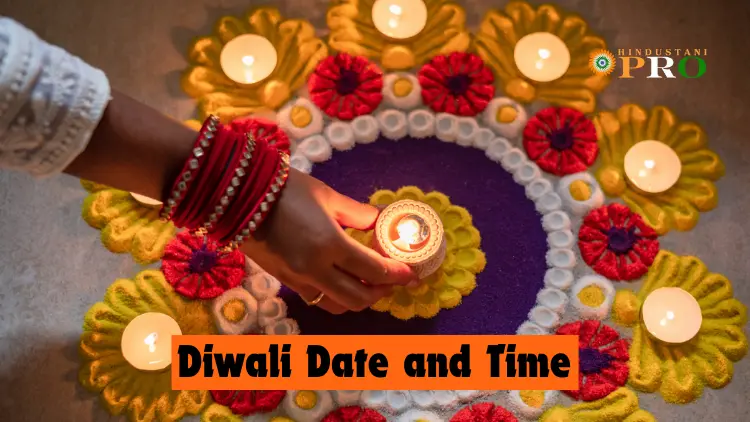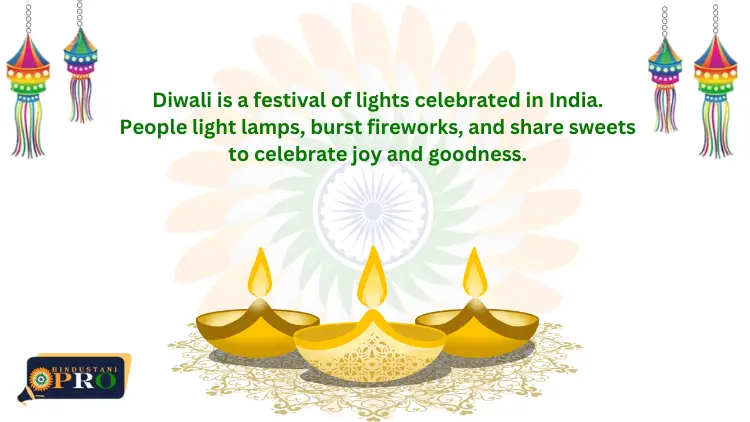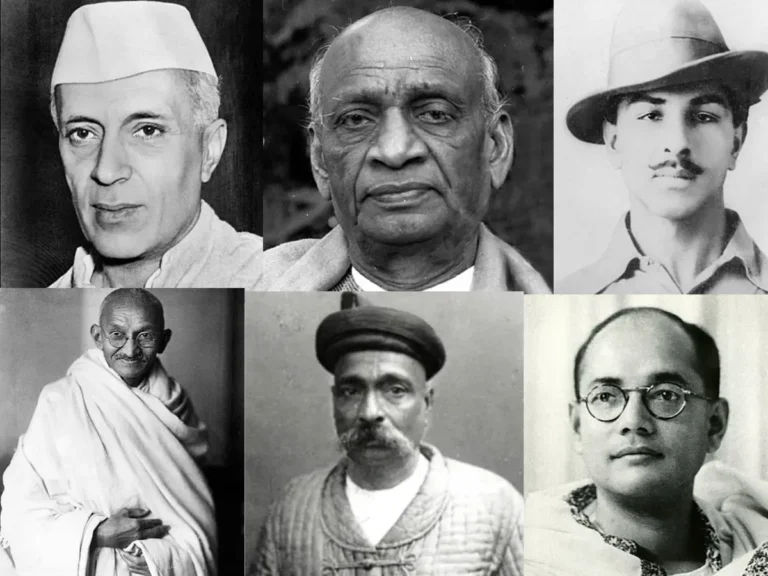Diwali 2024 date | history,Celebration,Puja, Rituals, Muhurat & time
Diwali, also known as the Festival of Lights, is one of the most important and widely celebrated festivals in India and among Hindus worldwide. It symbolizes the victory of light over darkness, good over evil, and knowledge over ignorance. The festival usually lasts for five days, with the main celebrations occurring on the third day.
In this article, we cover Diwali 2024 date, including its date, History, and Celebrations. We also discuss the Puja, Rituals, Muhurat, and timings.
Diwali 2024 Date
The 2024 Diwali celebration begins with Dhanteras on Tuesday, October 29, 2024, and concludes with Bhai Dooj on Sunday, November 3, 2024. Lakshmi Puja, the most auspicious day of the Diwali festival, is celebrated as the main day of Diwali. Therefore, Diwali 2024 falls on Friday, November 1.
| Festival | Date |
|---|---|
| Dhanteras | October 29th, 2024 (Tuesday) |
| Narak Chaturdashi (Chhoti Diwali) | October 31st, 2024 (Thursday) |
| Diwali (Laxmi Pujan) | November 1st, 2024 (Friday) |
| Govardhan Puja, Annakut | November 2nd, 2024 (Saturday) |
| Bhai Dooj, Yama Dwitiya | November 3rd, 2024 (Sunday) |
Muhurat date & Time for Diwali in 2024
| Festival | Date | Day | Auspicious Timing |
|---|---|---|---|
| Dhanteras | October 29th, 2024 | Tuesday | 6:55 PM to 8:22 PM |
| Kali Chaudas | October 30th, 2024 | Wednesday | 11:45 PM to 12:36 PM |
| Narak Chaturdashi | October 31st, 2024 | Thursday | 11:39 PM to 12:28 AM |
| Diwali (Laxmi Pujan) | November 1st, 2024 | Friday | 5:36 PM to 6:16 PM |
| Govardhan Puja, Annakut | November 2nd, 2024 | Saturday | 6:14 AM to 8:33 AM |
| Bhai Dooj, Yama Dwitiya | November 3rd, 2024 | Sunday | 1:13 PM to 3:33 PM |
What is Diwali 2024 Date & Time in India?

According to the Diwali 2024 date in the Indian calendar, the festival will begin with Dhanteras on Tuesday, October 29, 2024, and end with Bhai Dooj on Sunday, November 3, 2024. The main celebration, Lakshmi Puja, will be observed on Friday, November 1, 2024.
For more update visit: Hindustani Pro
Diwali Celebration Date and Time in Different Cities of India
The date and time for Diwali celebrations are consistent across India, with regional variations in specific customs and practices. However, the primary Diwali festival day in 2024, including Lakshmi Puja, is observed on Friday, November 1, 2024. Overview of how the celebration might be observed in different cities:
| City Nmae | Date | Time |
|---|---|---|
| Delhi | Friday, November 1, 2024 | 7:00 PM to 9:00 PM. |
| Mumbai | Friday, November 1, 2024 | 6:00 PM and 8:00 PM. |
| Kolkata | Friday, November 1, 2024 | 7:00 PM to 9:00 PM. |
| Chennai | Friday, November 1, 2024 | 6:30 PM to 8:30 PM. |
| Bengaluru | Friday, November 1, 2024 | 7:00 PM to 9:00 PM. |
| Hyderabad | Friday, November 1, 2024 | 6:30 PM to 8:30 PM. |
| Ahmedabad | Friday, November 1, 2024 | 7:00 PM and 9:00 PM. |
| Pune | Friday, November 1, 2024 | 6:30 PM to 8:30 PM. |
| Jaipur | Friday, November 1, 2024 | 7:00 PM to 9:00 PM. |
| Chandigarh | Friday, November 1, 2024 | 7:00 PM to 9:00 PM. |
The specific timing for rituals and celebrations can vary based on local traditions and the auspicious timings (muhurat) set by local priests. For exact times, many people refer to local almanacs or consult with local priests to determine the most auspicious time for performing the puja.
Why is Diwali celebrated? History of Diwali
Diwali, also known as Deepavali, is celebrated for various reasons, with its significance deeply rooted in history and mythology. Overview of why Diwali is celebrated and its historical background.
Why is Diwali Celebrated?
- Legend of Lord Rama: In Northern India, Diwali commemorates the return of Lord Rama, his wife Sita, and his brother Lakshmana to Ayodhya after 14 years of exile and the defeat of the demon king Ravana. The people of Ayodhya illuminated the city with oil lamps to celebrate their return, symbolizing the triumph of good over evil.
- Victory of Lord Krishna: In some regions, Diwali celebrates Lord Krishna’s victory over the demon Narakasura, marking the triumph of righteousness.
- Worship of Goddess Lakshmi: Diwali is associated with the worship of Goddess Lakshmi, the deity of wealth and prosperity. On this day, devotees seek her blessings for success, happiness, and prosperity in the coming year.
- New Beginnings and Prosperity: Diwali is also seen as a time for new beginnings. It marks the start of a new financial year for many businesses, and people clean and decorate their homes, buy new clothes, and make significant purchases
History of Diwali

You Can Also See: Independence Day 2024
- Ancient Origins: Diwali has ancient roots and is mentioned in various Hindu texts and scriptures. The festival has evolved over centuries, incorporating local legends and customs from different regions of India.
- Ramayana: The Ramayana, an ancient Indian epic, narrates the story of Lord Rama’s return to Ayodhya, which is central to Diwali celebrations in many parts of India.
- Mahabharata: Some traditions also link Diwali to the Mahabharata, which is believed to be the day when the Pandavas returned to their kingdom after exile.
- Goddess Lakshmi: According to Hindu mythology, Diwali is the day when Goddess Lakshmi emerged from the ocean of milk during the churning of the ocean (Samudra Manthan). Her arrival signifies prosperity and wealth.
- Kali Puja in Bengal: In West Bengal and parts of Eastern India, Diwali is celebrated as Kali Puja, dedicated to the goddess Kali. This tradition highlights different regional interpretations of the festival.
- Historical Events: Some historical accounts suggest that Diwali also commemorates the coronation of King Vikramaditya and other significant historical events that symbolize the celebration of light and prosperity.
Bottom Line
Diwali 2024 date will see celebrations starting on October 29 with Dhanteras and ending on November 3 with Bhai Dooj. The main day of the festival, Lakshmi Puja, is on November 1. Diwali symbolizes the victory of light over darkness and is celebrated with lighting lamps, decorating homes, and embracing new beginnings and prosperity.






